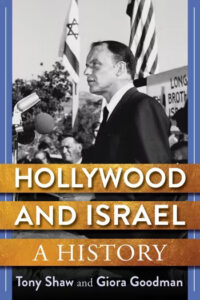
Hollywood and Israel: A History, written by Tony Shaw and Giora Goodman, details an in-depth history between the two.

Hollywood has always had a special relationship with Israel. It might not feel like it today but many celebrities rallied around Israel during its early days. Whether it was making trips or raising money, they were there for the Jewish state. One of the things that book explores is the role of show business in the relationship. For instance, what was necessary for a film to get the greenlight for not only production in Israel but the government’s cooperation. How did the government respond when a screenplay was not to their liking? What role does media play in how Americans view the relationship? These questions do not even start to touch the tip of the iceberg.
Dore Schary, Arthur Krim, Arnon Milchan, and Haim Saban are some of the bigger names behind the scenes. Schary was one of Hollywood’s leading Zionists during the years leading up to and after Israel’s birth. During the 1960s, the former RKO production chief was the ADL chair and used his position to lobby for Israel. Schary moved to New York after MGM fired him and he became a bridge between Hollywood and Israel through his position with the ADL. Interestingly enough, Schary was heading MGM when he greenlit Exodus. Following his ousting, the film made its way over to Bob Benjamin, Max Youngstein, and Arthur Krim at United Artists. The trio would use their roles to support Israel on screen. Krim would become such a force that he advised the Johnson Administration on Israel.
Schary’s work wasn’t just limited to advancing Israel’s image on screen. Shaw and Goodman write on page 145:
“Schary arguably put more effort into improving the image of the Jew, and by extension, Israel, on the American screen than any other Hollywood figure.”
As chair of the Motion Picture Project, Schary set up the National Jewish Community Relations Advisory Council so that the studios could “make more films with Jewish themes and to depict Jewish characters more positively.” Hollywood could certainly use someone in a similar role today.
Some of the major milestone birthdays were broadcast nationwide through 1998. Israel’s 70th birthday in 2018 was celebrated on a studio lot and not televised. What happened to change this? Is it because of the further divide between liberals and the Jewish state? Quite possibly. We are already seeing what social media is doing to the relationship. I’ll be honest: I support Israel’s right to exist and defend herself. However, current prime minister Benjamin Netanyahu and his current government is going to make it very hard to defend criticism against government policies. His government currently includes racists, which makes increasingly harder for a two-state solution.
The book touches on the depictions of Arabs and Palestinians on screen. It also touches on the Vanessa Redgrave incident at the Oscars in April 1978. Ironically enough, Redgrave won Best Supporting Actress for a role in a film about the horrors of Nazism before turning antisemitic in her speech by referring to “Zionist hoodlums.” It wasn’t until years later that Redgrave specified that it was about Meir Kahane’s JDL. At the time, it wasn’t seen that way and so you couldn’t be shocked at the number of Jews who were upset and wanted to see her blacklisted. Paddy Chayefsky received an ovation when he called her out while presenting the screenplay awards.
“There’s a little matter I’d like to tidy up, at least if I expect to live with myself tomorrow morning. I would like to suggest to Miss Redgrave that her winning an Academy Award is not a pivotal moment in history, does not require a proclamation, and a simple ‘thank you’ would have sufficed.”
I would not expect anything less from the Network screenwriter. There was fallout at the time and many other actors used to moment to remind people of their own Zionism, including Gregory Peck. As if the Oscars fallout wasn’t enough, Redgrave wanted Equity to ban British artists from working in Israel or British films playing in Israel. This put her into a war of words with Theodore Bikel. Surprisingly, Redgrave did not get any sympathy from Jane Fonda as one might have expected at the time. The exclamation point on it all is that NBC aired its four-part Holocaust miniseries in mid-April 1978.
There’s a lot to take a way from Hollywood and Israel. If I had room, I’d discuss more of what the book talks about. The authors go into a lot of behind-the-scenes detail especially when it comes to Hollywood productions in Israel and the cooperation by the government. More recently, it discusses some of the recent partnerships that have seen Israeli studios bring adaptations to America. While some Israeli series have found an audience in America, Homeland is probably the most critically acclaimed adaptation of an Israeli series.
I’m sorry to be that person but my biggest gripe with the book is “Holocaust” is in lowercase throughout the entire book. The Holocaust is a tragic event that killed six million Jews and it’s a word that should never be in lowercase whenever talking about the Shoah. When an author is discussing either Holocaust movies or survivors, the word needs to start with a capital letter. Here’s to a correction during the next printing.
Hollywood and Israel: A History is a good starting point for anyone wishing to learn more about the relationship.
Columbia University Press released Hollywood and Israel in March 2022.
Please subscribe to Solzy at the Movies on Substack.






